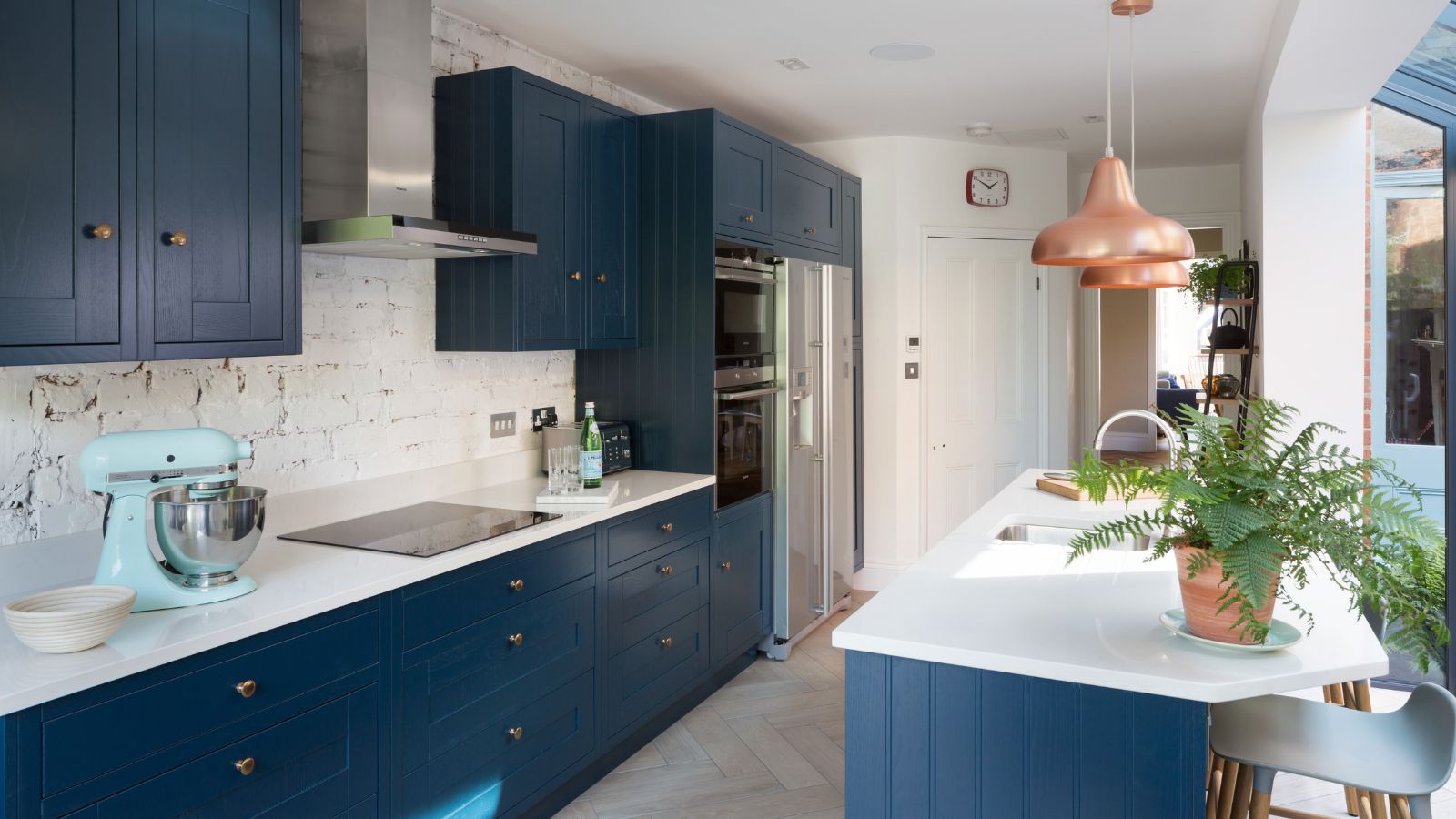If you struggle to clean your home, the Japanese cleaning principle of Kiyomeru may be the key
Kiyomeru can change the way you see chores for good


For many of us, cleaning isn't the easiest or most joyous household task. Whether our whole home is in need of a deep clean or some dishes have been piling up in the sink for a few days now, sometimes it all just feels very off putting to begin.
While trying to figure out how to live a more grateful life, I came across the principle of Kiyomeru (清める): a practice rooted in Japanese lifestyle that sees cleaning as something important, loving, and even as a form of meditation.
You can truly get motivated to declutter and clean, and change the way you see cleaning through adopting this lifetyle and world view. Instead of an annoying household chore, cleaning can become something therapeutic in your life if you're willing to let it. Here's what the experts have to say about carrying out Kiyomeru in your own home.
What is Kiyomeru? (清める)?

Translated to English, Kiyomeru means 'to purify'. With Kiyomeru, cleaning is seen as a ritual that cleanses not only the house, but also your soul.
Azumi Uchitani, writer, artist, lecturer, co-founder of the Japanese Wisdom Academy, and the author of the upcoming book YOSHUKU, Japanese Art of Manifesting, says, 'The Japanese word Kiyomeru (清める) is represented by the character 清, which signifies purity and cleanliness. This concept goes beyond mere physical cleanliness, meaning a deeper spiritual purification, as well as energy cleansing of items we use and our surroundings. Rooted in the profound cultural traditions of Shinto and Buddhist beliefs, Kiyomeru reflects the importance of harmony, renewal, and reverence for the sacred in Japanese culture.'
Harmony is an important part of this concept, encouraging people to learn how to live well alongside their possessions and within their surroundings. So when Kiyomeru is applied to cleaning, it also refers to a cleansing of your home's energy (or 'chi').
How can Kiyomeru help a person to clean their home?

When a person cleans their home, they tend to travel from room to room or space to space, decluttering as they go and tackling messes as they see them. It isn't something too many of us look forward to, as cleaning can be quite the chore.
Design expertise in your inbox – from inspiring decorating ideas and beautiful celebrity homes to practical gardening advice and shopping round-ups.
However, in Japanese culture, cleaning isn't seen this way. It isn't seen as a laborious task, but instead as a way to show appreciation towards our home and our possessions.
'The practice of Kiyomeru is deeply embedded in Japanese culture and way of life,' says Azumi. 'A prime example is the Japanese tea ceremony, Sado (or Chado) 茶道, a profound ritual that emphasizes the experience of oneness and the exchange of pure energy through the making and serving of matcha tea.
'This sacred exchange between the host and guest begins and ends with Kiyomeru – a beautiful performance of cleaning and purification of the utensils. While they may already appear clean, the purpose is to purify the energy of each item and express gratitude for their role. This ritual reflects the harmonious interplay of cleanliness, mindfulness, and reverence for all that is used.'
If we approach the task of cleaning our homes every day with this flipped mindset – one of gratitude and thankfulness – we gain a deeper sense of perspective. What was once a task we loathed now shifts into focus just how lucky we are to have a place to keep clean at all. Re-framing the task in this way to remove negative associations can create less friction between a person and cleaning their home.
It can also help you clean when you're feeling overwhelmed.
How to follow the principle of Kiyomeru when cleaning your home

To begin implementing Kiyomeru and its principles into your life, you must first begin to view it as more than just a tool, but rather a way of life.
'Kiyomeru is a way of life,' says Azumi. 'It is to maintain a harmonious energy flow in our life. So first of all, we need to grasp the mindset that our surroundings are an extension of ourselves and as we take care of our body, we should take care of our surroundings. We are energetically connected with them and when the outside is clean and decluttered, the energy flows smoothly, and our life flows harmoniously.'
Azumi shares this step-by-step guide on cleaning your home with Kiyomeru as a way of life:
- Reprogram your subconscious mind: Reflect on your beliefs and attitudes toward cleaning and decluttering. What thoughts or feelings are you holding onto? If you have any unwilling feelings attached to cleaning and decluttering, you must change this first! Think of your living and working space as an extension of yourself. As you brush your teeth every morning and night, why not brush your toilet to keep it clean? As you shower every day to clean your body, why not tackle any dust? Task stacking will help.
- Create a daily morning and evening purification ritual: Begin your day with simple actions that set the tone for purity and order. After waking up, make your bed immediately, open a window to invite fresh air, and sweep the floor. In the evening, incorporate small acts of tidying like a closing shift and end the day on a harmonious note. These are things people with clean homes have in common.
- Establish daily, weekly, monthly, and seasonal cleaning habits: Make cleaning a natural part of your routine, just like brushing your teeth or taking a shower. Daily: Focus on essential tasks like tidying surfaces, wiping counters, and light sweeping. Clean the toilet, shower and bath daily! Weekly: Dedicate time for vacuuming, dusting, and organizing wardrobes. [Here are five household chores expert say should be done every week without fail]. Monthly: Tackle deep cleaning your home and larger cleaning projects, such as washing windows or cleaning out the refrigerator.
- Seasonal: Refresh and transition your wardrobe in summer and winter, and conduct deep-cleaning sessions at the end of the year, including thorough dusting and cleaning of windows, the kitchen, and other areas.
- Set rules: Keep the first point of contact with your home, the entryway, inviting and clean. Ensure the door and doormat are spotless. Treat your shoes with care, as they carry the weight of your day. Take them off upon entering, place them neatly in their designated space, and thank them for their service. In the kitchen, never leave dirty dishes in the sink, wash them immediately or load them into the dishwasher. End your day by cleaning the sink to maintain a sense of order. In the bathroom, make it a habit to clean the toilet every morning and evening.
- Dedicate 10 minutes for ritual purification: Allocate just 10 minutes each day to maintain cleanliness and purity. These small, consistent actions will cultivate harmony and mindfulness in your space.
Where in my home should I start cleansing?

Karina Toner, professional cleaner and operations manager at Spekless, recommends starting with the areas of home that are most important to you, which in many households are entryways and bedrooms.
'Begin in areas where cleanliness matters most, such as the entryway (to welcome positive energy) or your bedroom (to support restful sleep),' says Karina. 'Opting to use nature's best deodorizers and natural cleaning products as you go around your home, too, is a great way to cleanse without the scent or harshness of strong chemicals.'
Karina likes the Mrs Meyers multi-surface cleaner, available on Amazon. This one is their acorn spice scent, though it comes in a variety of other aromas including the Mrs Meyer's all purpose cleaner spray in bluebell, and the Mrs Meyer's multi-surface cleaner set in basil.
What are the benefits of Kiyomeru?
Karina says, 'Kiyomeru is more than a method, it’s a mindset shift that encourages respect for your environment and yourself. By adopting this approach, you can turn cleaning from a dreaded task into a ritual of care and rejuvenation. Even small steps taken with intention can transform your home into a sanctuary of peace and positivity.'
Below, our pros share five of the benefits of Kiyomeru, showcasing the ways it can help you on your journey to a cleaner home, as well as developing a better relationship towards cleaning:
- It creates a sense of harmony and balance: 'Kiyomeru helps to bring a heightened awareness to maintain the purity of both our inner and outer worlds. By doing so, we create a peaceful and loving environment for both ourselves and those around us,' says Azumi.
- You will take better care of your possessions: 'When we cultivate a sense of appreciation for everything we use and encounter in life, we begin to treat these things with respect and love,' says Azumi. 'This mindful approach transforms how we interact with our surroundings, encouraging us to use and care for them thoughtfully and lovingly.'
- Your mindset about cleaning will become re-framed in a positive way: Azumi says, 'If you are struggling to clean and declutter your home, you must examine your belief system regarding cleaning. Do you subconsciously view it as a menial or low-value task? By shifting your perspective with “Kiyomeru” in your daily life, you can embrace cleaning as an act of care and appreciation rather than a chore.'
- Energy shift: 'A purified space can uplift your mood, boost motivation, and create mental clarity,' says Karina.
- Self care: 'Transforming cleaning into a mindful practice helps you feel accomplished and nurtures your well-being,' says Karina.
There are many insightful practices and lifestyle shifts derived from Japanese culture which will help you to keep your home clean and organized. Inyo-onyo is another great one to explore, teaching us the value of 'empty space' and how living with less doesn't equate to deprivation or scarcity, but rather quality and abundance.
You can also delve into our top cleaning tips to help you get the job done well all over your home.

Ciéra is a writer and regional laureate with particular passions for art, design, philosophy and poetry. As well as contributing to Homes & Gardens, she's an Editorial Assistant for Design Anthology UK and a contributing writer for magazines including Livingetc, Apartment Therapy, House Beautiful and Ideal Home. Previous commendations of hers include being Highly Commended by The Royal Society of Literature and receiving a prestigious MA Magazine Journalism scholarship to City, University of London.